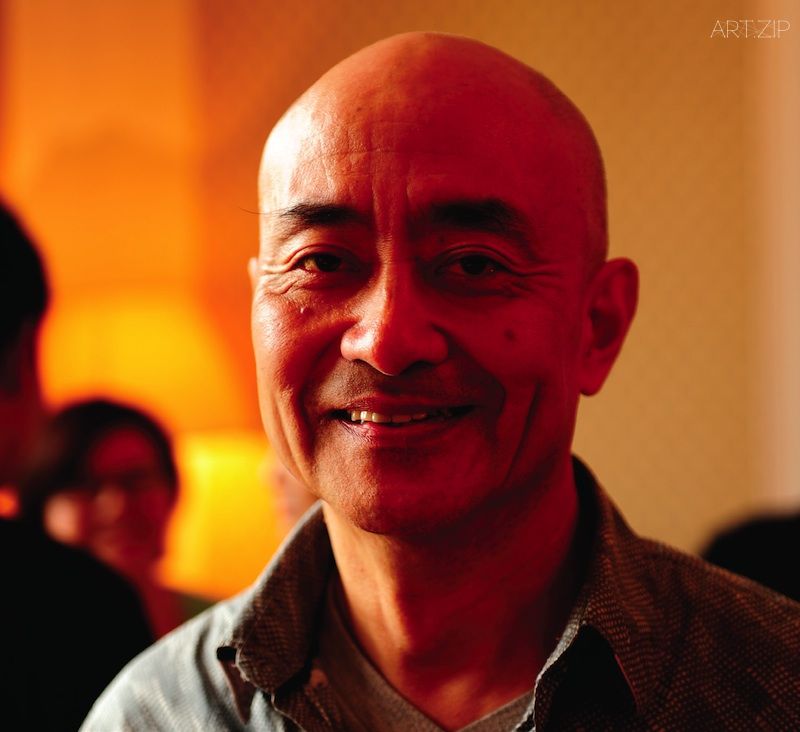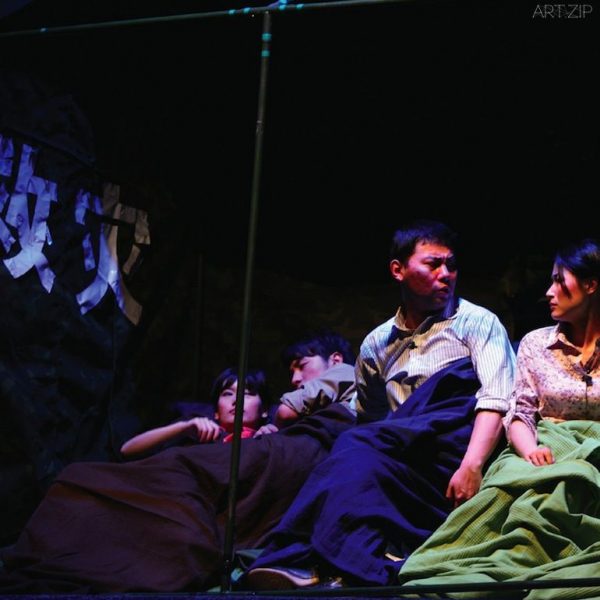
ART.ZiP: What kind of influence and constraint do the period when you served as a dean in the Hong Kong Academy for Performing Arts have on your art creation? (Comparison between the roles of artist and manager)
J: When I served as a dean of the School of Play in Hong Kong, I directed less plays. I tried to keep directing one play in the School every year, as for directing plays for other troupes, it depended on my time, so among the eight years, in three years I merely had one play every year and in one year I did not rehearse any play owing to large amount of work. Perhaps this is a kind of ‘constraint’? But on the other hand, students in the School of
Play would perform seven or eight plays every year, the selection of plays and the arrangement of their staff, including directors and actors, were proposed by related teachers and department heads, and I would fix them on at last (I would consider whether their various subjects and different styles are in balance, whether they can meet the needs of students’ learning, etc.), similar to an art director of a troupe, I would look over the rehearsal process of each play and exchange views, and I could benefit and gain inspiration from others’ creation. For example, when meeting some plays that I would not choose or even did not know before, I would firstly do some research into the plays, and then see how my colleagues and students construct them on the stage; this process for me, as a director, can also broaden my artistic experience. As a director, I will not throw away the vision and thought of a director at the time of serving as a manager, I think, this is what is called ‘one’s nature is hard to change’.
Moreover, I think the functions of a ‘director’ have contained some about ‘management’. I am wondering is there a big-name director who is able to be absorbed solely in the ‘pure art’ and ignore all chores. In my view, for a director, it is probably always hard to avoid being involved in some affairs of management and arrangement. Perhaps just because of this, in the interview for the dean, when the interview panel asked me whether I have management experience, I replied without thinking: ‘I have been a director for many years.’ I think the change of role is not necessarily a matter of difficulty; the key is to adapt.
ART.ZiP:在香港演藝學院擔任院長期間對於您 的藝術創作上有怎樣的影響和制約?(藝術家 和管理者角色間的比較)
J: 在香港當戲劇學院院長後,我導戲的數量減 少了,每年保持在學院導一臺戲,至於為別的劇 團導戲則看有沒有時間的許可而定,所以八年 中有三年是單純的每年一戲,有一年因為工作 重而整年未排戲。這也許可說是一種”制約”?但 另一方面,戲劇學院每年學生公演七八臺戲,劇目選取、人員安排包括定導演和演員等,由相關 的系主任和教師提出,由我最後選定(考量中外 古今題材、不同風格的平衡及適應學生學習的 需要等),相似於一個劇團的藝術總監,每個戲 的排練過程中我都會去看並交換意見,從別人 的創作中我得到收益和啟發。比如有些戲是我 自己不會選的甚至之前不知道的,那麼我會先 對劇本鑽研一番,然後又看我同事和學生怎樣 在舞臺上架構起來,這個過程對於一個做導演 的我來說,也是增長藝術經驗的:我作為一個 導演在當管理者的時候仍不會丟棄導演眼光、 導演思路,我覺得,本性難移吧。
說多一點,我覺得”導演”的職能裡面就包含着 一定的”管理”成分。我在想像是否有頂級大牌 導演可以只顧”純藝術”而絶對不問雜事的?照 我的想法,一個導演大概總難免會被捲入一些 屬於管理、安排方面的事務。也許正因為此,我 應聘院長面對招聘小組問我有無管理經驗時脫 口而出回答說:”我當了多年導演。”我覺得,角色轉換不一定是難事。重要在於適應。
ART.ZiP: Talk about the change of your role in terms of creation from an artist to an educator (creating on your own and guiding others)?
J: Similarly, art creation and art education are two different areas but have a lot in common. I believe ‘the rich experience of creation must be beneficial to the teaching’, therefore, I always advocate that the teachers in our school should direct and perform plays in person from time to time (we call it outside job, it has a time limit and needs application and approval, so as not to affect their teaching), in this way, they can acquire alive and new knowledge and experience to teach students! Teaching without practicing will be bound to dry up. Moreover, art education can never be inseparable from practice, so the teachers should always keep engaging in creation.
Nevertheless, indeed, education is to ‘guide others’ rather than ‘creating on your own’, that is to say, it aims to enable students to learn how to create; so, do not be habitually anxious to create on your own. And sometimes, it really needs to ‘constrain yourself’. For instance: I once directed a British comedy in the Directing Department of the Shanghai Theater Academy, since all the students majored in directing, the focus of teaching is to enable them to grasp the process and techniques of directing a play, thereupon, I divided the students of a class into three groups and asked each group to rehearse a version, and I was responsible for the overall guidance and modification. In the phase of their performance, the three groups would perform same number of scenes in turn. In fact, there were a lot of differences in processing between all the three groups; what’s more, their processing was also different from my possible processing; in spite of this, I still let them develop their own ideas of directing and made no alteration except for some integration. I told myself don’t itch to change it into my style. This may also be due to the influence of the UK and US on me, where the teachers (including directors) always make every attempt to stimulate students’ own creativity, rather than forcing students to follow their own modes.
ART.ZiP:談談您從藝術家到教育家(自己的創 作與引導別人創作)角色的改變?
J:同樣,藝術創作和藝術教育是兩個不同領域, 但之間有着很多共通,我信奉”豐富的創作經驗 一定會有益於教學”,因此我總是非常提倡我學 院的教師們自己多導戲多演戲(我們叫outside job,有時間限制,要申請並得到批准,因為不 能影響教學),這樣才有活的、新的知識和經驗 可以教學生!不做實踐,教着教着一定乾涸。何 況藝術教育總是和實踐不可分,所以教師也總 是時時捲入創作的。
但教育的確是”引導別人”而不是”自己創作”,就 是說目的在於讓學生學會創作,那麼就不要習 慣地急於自己去創作。有時,還真要”忍得住”。 舉例:我曾在上海戲劇學院導演系指導製作一 個英國喜劇,由於學生都是學導演的,那麼教 學的重點就是要讓他們掌握導一個戲的過程和 技法,所以我把一個班學生分成了三個組,每組 自行排出一版,我總體引導、整修。到了演出階 段,三組輪流上演,場次數目相同。其實三組的 處理是有很多不同的,而且也與我可能的處理 有不同,但我讓他們去發展自己的導演設想,我 除了整合外不作改動。我告訴自己絶不手癢去 改成我自己習慣的模式。這可能也是我在英、 美受到的影響,這裡的老師們(包括導演們)總 是注重千方百計激發學生的自身的創造力,而 不是總要學生跟從自己那一套。




